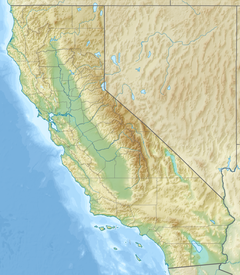Jalama Creek is a 11.3-mile-long (18.2 km)[2] westwards-flowing stream that begins in the western Santa Ynez Mountains and flows to Jalama Creek estuary and Jalama Beach County Park and the Pacific Ocean.
| Jalama Creek | |
|---|---|
 Jalama Creek Lagoon Panorama courtesy of Matt Stoecker 2001 | |
| Location | |
| Country | United States |
| State | California |
| Region | Santa Barbara County, California |
| Physical characteristics | |
| Source | Western Santa Ynez Mountains |
| • location | 8.5 miles (13.7 km) west-northwest of Gaviota, California |
| • coordinates | 34°30′04″N 120°21′39″W / 34.50111°N 120.36083°W[1] |
| • elevation | 1,610 ft (490 m) 34° 30' 9.95" N 120° 21' 39.57" W |
| Mouth | Confluence with the Pacific Ocean |
• location | 4.6 miles (7.4 km) north of Point Conception |
• coordinates | 34°30′40″N 120°30′10″W / 34.51111°N 120.50278°W[1] |
• elevation | 0 ft (0 m) |
| Length | 11.3 mi (18.2 km) |
| Basin features | |
| Tributaries | |
| • right | Escondido Creek, Gasper Creek, Espada Creek |

History
editJalama Creek and the historic Jalama station are derived from the Purisimeño Chumash village named "Xalam", meaning "bundle".[3]
Watershed and course
editThe Jalama Creek watershed drains 24 square miles (62 km2) of the western Santa Ynez Mountains.[4] Flows in the upper reaches are seasonal, becoming perennial at the confluence with its Escondido Creek tributary about 3.6 miles (5.8 km) from its creek mouth.[4] Further downstream the next two tributaries are Gasper Creek and Espada Creek, after which it reaches the Jalama Creek estuary, and ultimately, the Pacific Ocean.
Ecology and conservation
editJalama Creek and its estuary are home to federally endangered Southern California steelhead trout (Oncorhynchus mykiss).[5][6][7] In 2017, The Nature Conservancy purchased 24,329 acres of land in the area, now renamed the Jack and Laura Dangermond Preserve, which covers 97% of the Jalama Creek watershed. Over 100 studies of the areas biology and ecology are underway.[7] The Nature Conservancy removed two dams on lower Jalama Creek, restoring access for steelhead trout to 12.3 miles (19.8 km) of the stream.
See also
edit
References
edit- ^ a b "Jalama Creek". Geographic Names Information System. United States Geological Survey, United States Department of the Interior.
- ^ U.S. Geological Survey. National Hydrography Dataset high-resolution flowline data. The National Map Archived 2012-03-29 at the Wayback Machine, accessed October 14, 2023
- ^ Erwin S. Gudde (1998). California Place Names: The Origin and Etymology of Current Geographical Name. Berkeley, California: University of California Press. p. 182. ISBN 978-0-520-26619-3.
- ^ a b Peter Osmolovsky and Mary Hamilton (March 27, 2013). Total Maximum Daily Loads Technical Report and Recommendations for Site-Specific Numeric Water Quality Criteria for Chloride and Sodium for the Jalama Creek Subwatershed, Santa Barbara County, California - Final Project Report (Report). San Luis Obispo, California: California Regional Water Quality Control Board Central Coast Region. p. 75.
- ^ Matt W. Stoecker. Steelhead Assessment and Recovery Opportunities in Southern Santa Barbara County, California (PDF) (Report). Santa Barbara, California: Conception Coast Project. Retrieved October 14, 2023.
- ^ Gordon S. Becker; Isabelle J. Reining (October 1, 2008). Steelhead/rainbow trout resources of Santa Barbara County (PDF) (Report). Center for Ecosystem Management and Restoration (CEMAR). Retrieved October 14, 2023.
- ^ a b Louis Sahagún (October 14, 2023). "Environmentalists are turning a rugged stretch of California coast into a lab for conservation". Los Angeles, California: Los Angeles Times. Retrieved October 14, 2023.
